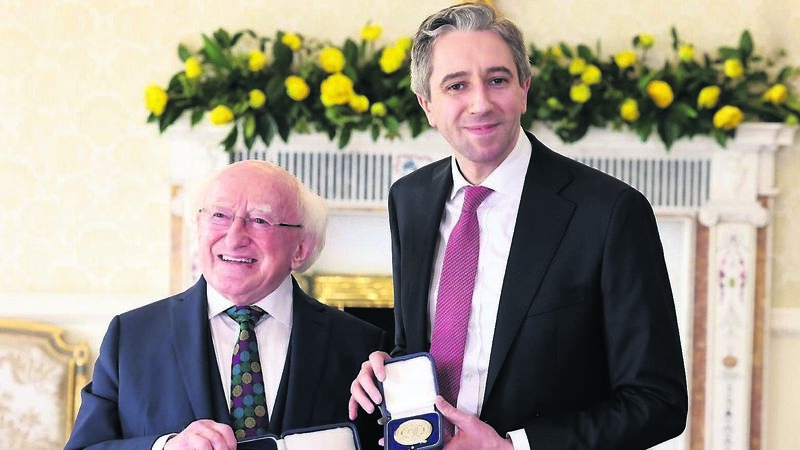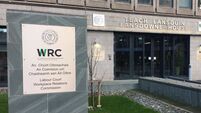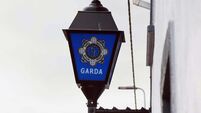When will the next election be? Most Cork candidates think it will be quite soon

Newly elected Taoiseach Simon Harris and President Michael D Higgins at Áras an Uachtaráin as he gets his seal of office in April. Picture: Leon Farrell/© RollingNews.ie
It is Taoiseach Simon Harris’s absolute prerogative to decide when to call a general election, and despite everything Tánaiste Micheál Martin has said about wanting to see this Government serve its full term, the overwhelming majority of Cork candidates believes the general election will take place next month.
A text poll by The Echo of declared candidates shows that of 39 respondents, 37, or 95% of respondents, believe the election will take place in November.
One Cork TD, first elected in 1997, and re-elected five times, said that in his experience the current political speculation is unprecedented.
“I have never seen so much feverish commentary on the date of an election before in my political career,” said Fianna Fáil TD for Cork North West Michael Moynihan.
“For some reason this fixation with November has appeared out of somewhere and it has consumed public commentary, certainly amongst politicians and journalists.”
Guilty as charged, but you don’t need a weatherman to know which way the wind blows, as Bob Dylan said, and politicians tend to be keen judges of prevailing trends.
Then again, perhaps they’re all wrong, and perhaps this Dáil really will run to full term in March, or near enough to it in February.
Perhaps the election will be held in early December, when all of those budget giveaways have had a chance to reach people’s pockets but before all of that cash has achieved the status of eaten bread.
Or perhaps by the time you read this, Mr Harris will already have blown the whistle and called full time on the 33rd Dáil.
Perhaps, just back from a washed-out Washington and a meeting with Joe Biden in the Oval Office, the Taoiseach feels he should head straight to the Park, phoning Michael D to say he’s en route.
If he does, he might reflect in the car that trips to Washington have brought the last couple of taoisigh what sports club PROs traditionally refer to as “mixed fortunes”.
On March 12, 2020, with covid tightening its grip on the world, Leo Varadkar announced the first lockdown from outside Blair House, across the road from the White House.
Two years later, on St Patrick’s Day, Micheál Martin tested positive for covid and missed his chance to give Joe Biden the bowl of shamrock.
However it works out, there are two key pieces of legislation which likely will have to be passed before any Dáil dissolution, and those are the Finance Bill and the Social Protection Bill, which need to be passed before Budget 2025 can be enacted. So in all probability we can expect those two Bills to be rammed through the House before any election is called.
After all, there’s not much point having a giveaway budget if you snatch it away from the electorate at the last second.
It is worth pointing out that the longer this Government runs, the closer it gets to the now traditional annual winter crisis in the HSE, and the higher our already record rates of homelessness will potentially climb.
We were already at 14,486 at the end of August, according to the Department of Housing’s September figures, with 10,067 adults and 4,419 children accessing emergency accommodation.
Current polling might also be worth considering.
With eight to 10 points between Fianna Fáil and Fine Gael at the moment, one Fianna Fáiller said this week:
“We’re directly competing with the Blueshirts in some constituencies, and those percentage points could translate into seats.”
Many Soldiers of Destiny probably think it might be worth waiting to see if the shine wears off of the newish Taoiseach, while Fine Gaelers are probably anxious to cash that goodwill as soon as possible.
So perhaps Simon Harris faces the choice of upsetting his own TDs or upsetting the Tánaiste.
The comments of one seasoned observer bear repeating:
“Simon needs to keep Micheál on side about the date of the election because (a) without FF co-operation he can’t get the Finance and Social Protection Bills through; (b) because if they fall out, it could be argued that Simon no longer has the confidence of the Dáil ... and (c) — most important — they’ll be expecting to do business again after the election.”
Not to forget the Green Party.
While its members will point to what they will say has been an outsized and environmentally significant contribution in this Government, there seems to be little Green appetite for an early election in the face of what may well be its second electoral wipeout in a generation.
That said, there seems to be a certain gloom that the timing probably won’t make any odds either way.
Green supporters will say it is unfair that they should be singled out, as the junior coalition partner, for voter ire at the sins of this Government, of course they will, but that’s what tends to happen to junior coalition partners.
Ask the Labour Party. Ask John Gormley.
Politics is a cruel business, and the truth is there are unlikely to be too many tears shed on the Fianna Fáil or Fine Gael backbenches if the Green vote collapses next time out.
If that does happen, and if Michael Collins can land a decent haul of deputies at his new non-party party’s first time out, Independent Ireland is probably unlikely to play too hard to get when Simon and Micheál come a-wooing in the political ballroom of romance.
And then there’s Sinn Féin.
With the largest — and most effective — opposition party in the doldrums since the local elections, and now facing sustained criticism — not all of it unfair and not all of it politically motivated — for its latest mishandling of yet another child abuse scandal, the two larger coalition parties will be very anxious to honour the old political maxim that when your enemy is down, you should never, ever miss an opportunity to give them a really good kicking.
Hanging around and giving the Shinners a chance to recover wouldn’t really be something either Civil War party would have too much of an appetite to be doing.
Anyway, Fine Gael and Fianna Fáil know better than to write off Sinn Féin, and perhaps the party of the Easter lily may yet pull off another resurrection and become the republican king or queenmakers once the dust settles this time out or the next, especially if or when Micheál Martin — who celebrates his 40th year in politics next year around the same time he turns 65 — steps aside as Fianna Fáil leader as he heads, perhaps, to Europe or the Áras.
When will the next election be? Who really knows?
Most Cork candidates think it will be really soon.
Whenever Simon Harris does decide to go to the country, though, we know for an absolute fact that he will have to do so at some point between here and Thursday, February 20, 2025, with the latest possible date for a general election then being 30 days later, on Wednesday, March 12.
We know this because under the Electoral (Amendment) Act of 1927, no Dáil may continue more than five years, and this term began on February 20, 2020.
When the Taoiseach decides to fire the starting pistol on the next election, be that this winter or next spring, there is a precise choreography to be followed.
Whenever a taoiseach calls an election, he —and so far it has always been a he, but perhaps that may soon change — then travels to Áras an Úachtaráin and requests that the President dissolve the Dáil.
In theory, the President can refuse to grant the dissolution of the Dáil to a taoiseach who has ceased to retain the support of a majority in the Dáil, but to date no request for a dissolution has ever been refused.
Once that dissolution has been granted, the clock is ticking and an election must occur within 30 days.
The Clerk of the Dáil will then issue a writ directing the returning officer in each constituency to prepare for an election.
The polling day will then be set by Darragh O’Brien, the minister for housing, planning and local government.
Once the writ has been issued, the shutter comes down on any new political parties being added to the Register of Political Parties and up may go the election posters — although some have been up for a while with the fig leaf of notices of various planned public meetings sellotaped onto them.
Posters must come down within seven days of polling day.
Two days after the dissolution of the Dáil is the deadline for application for postal or special voting, while the deadline for registering or amending details on the register of electors is 15 days before polling day excluding Sundays, Good Friday, and public holidays.
Notice of election, which is a public notice of the times and arrangements for receiving candidate nominations, must be issued no later than the fourth day after the dissolution of the Dáil.
From 10am on the fifth day after the dissolution of the Dáil, candidates can nominate themselves, or be nominated by a Dáil elector, for their constituency or political party.
Candidates can continue to be nominated until 12pm on the seventh day after the dissolution of the Dáíl, and can withdraw their candidacy within 24 hours of the nomination deadline.
Polling day will be a minimum of three weeks after the dissolution of the Dáil and a maximum of four weeks, excluding Sundays and bank holidays.
The day after polling day, the boxes will be opened and the votes counted.
This general election, the Dáil will gain an additional 14 TDs, meaning that with 174 TDs it will be historically at its largest ever. This will mean a majority of 88 TDs will be needed to form a government.
The next government will almost certainly be a coalition — the last time we had a single party government elected with an over-all majority was in 1977, back when when Jack Lynch was taoiseach, a position inherited two years later by Charlie Haughey.
With coalition negotiations tending to be long and complicated, there is no official time limit to how long they can take.
In 2020, it took a leisurely 128 days to form a government and those negotiations resulted in the current coalition of Fianna Fáil, Fine Gael, and the Green Party.
In the event that TDs are unable to decide who should form a government, then the Taoiseach — who will still be Simon Harris until a new government is formed — may have to ask the President to dissolve the Dáil again.
And then we’ll be off again.










 App?
App?


